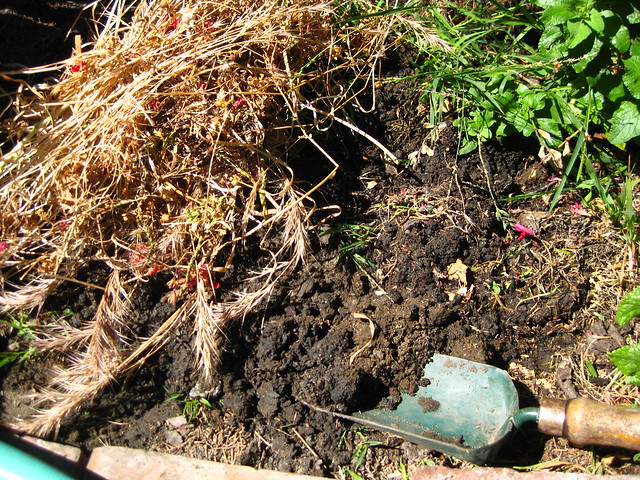Look in your garbage can. Go ahead do it... is it yucky and smelly? Would you want to stick your hand in it? What if your ring dropped in?
While you are looking ,look at all the food that is in this pail. This 'garbage' is potentially gold for your garden and yard. With a small effort your garbage cans would be cleaner, and your gardens healthier. With a giant bonus of feeding the Earth.
Does this look familiar? What do you do with these at your house? Mine,shown here, are in a gallon ice cream tub that we keep near the kitchen sink. All plates are scraped and any old stuff from the frig. goes in the bucket. Unfortunately sometimes more than once. The waste is then covered by leaves or grass clippings. Threw those into the landfill too? Well, don't. You are going to need them. Some towns have laws now that you can't put yard waste in the landfill.
This is a compost pile that will give you back a healthy garden. It will feed the birds, worms and squirrels. In our neck of the woods, it even feeds the box turtles! This is a component to a healthy backyard habitat. Did you ever think about how the forest is not piled high with leaves? In nature these things break down and feed the very plants that dropped them. Pretty wonderful scheme, now if we could just take a lesson from nature.
Earth knows no desolation.
She smells regeneration in the moist breath of decay.
- George Meredith
She smells regeneration in the moist breath of decay.
- George Meredith
Still not sure are you? OK, I know, what about the other animals...rats! This is a myth designed by those too lazy to do a minimal care of the pile. First, do not put meat into your pile. This can be done but not when you are new to composting. Keep the food waste covered by leaves or grass clippings. The compost pile should be damp, not too wet nor too dry. Get the kids involved. This experience is a life changing exercise. They will see the cycle of life in it's entirety.
Ahhh, getting it? For the kids, this is a year long study that can touch on all subjects.
- Writing - poems about the compost or a journal on it's activity,bugs or wildlife
- Science - this can involve temperature if you get a long compost thermometer or go by feel, besides all the obvious topics
- Recycling
- Math - weigh your garbage can before you start this then weigh it after , week one two etc., note differences in weight, smell and extrapolate for your street and town
- Reading - there are many site and books on this topic, let the kids do the research.
- Why does the compost pile break down but the landfill not?
- Wildlife count- here too do a before and after. (we have more hawks now because of the increase of small wildlife!)
 | ||||
Remember kids LOVE to get dirty and love to hold worms! This will be a great project for the whole family that let's them get to do both in the name of education. What could be better? How about a great garden?
Take care, learn more and you will!
The main characteristic of Nature's farming can therefore be summed up in a few words. Mother earth never attempts to farm without live stock;
she always raises mixed crops; great pains are taken to preserve the soil and to prevent erosion; the mixed vegetable and animal wastes are converted
into humus; there is no waste; the processes of growth and the processes of decay balance one another; ample provision is made to maintain large reserves of fertility; the greatest care is taken to store the rainfall;both
plants and animals are left to protect themselves against disease.
- Sir Albert Howard, An Agricultural Testament, 1940


No comments:
Post a Comment
Impressions from friends, thanks.